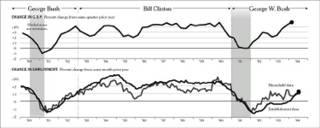The U.S. government ran a $1 billion budget surplus in December, helped by a rise in corporate tax payments, the Congressional Budget Office said in its latest budget report released on Friday.Told ya so.
The surplus, which compared with an $18 billion deficit in the previous December, helped create a smaller fiscal deficit for the first three months of the 2005 fiscal year, than in the same quarter of the prior year.
(via Instapundit)
More:
NRO's Larry Kudlow:
This week’s Treasury report on the nation’s finances for December shows a year-to-date fiscal 2005 deficit that is already $11 billion less than last year’s. In the first three months of the fiscal year that began last October, cash outlays by the federal government increased by 6.1 percent while tax collections grew by 10.5 percent. When more money comes in than goes out, the deficit shrinks.Still More:
At this pace, the 2005 deficit is on track to drop to $355 billion from $413 billion in fiscal year 2004. As a fraction of projected gross domestic product, the new-year deficit will descend to 2.9 percent compared with last year’s deficit share of 3.6 percent.
Former Treasury Secretary George Schultz in the August 4, 2004, New York Times:
These charts show the rate of change in real gross domestic product and in employment from 1990 to last June. The shaded areas show recessions. The vertical lines show when President Bill Clinton took office and when he left. Because the economy has momentum, it's useful to look carefully at the trends in evidence at the time of presidential transitions. When you look at the record, a quick summary is this: President Clinton inherited prosperity; President Clinton bequeathed recession.(via Phillip Winn)

Kick save and a beauty (click to enlarge)

No comments:
Post a Comment